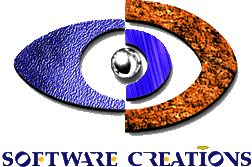Difference between revisions of "Software Creations"
From Sega Retro
m (Text replacement - "| width= |" to "|") |
|||
| Line 1: | Line 1: | ||
{{CompanyBob | {{CompanyBob | ||
| logo=Softwarecreations_logo.png | | logo=Softwarecreations_logo.png | ||
| − | |||
| founded=1986 | | founded=1986 | ||
| defunct= | | defunct= | ||
Revision as of 03:09, 12 September 2023

| ||
| Software Creations | ||
|---|---|---|
| Founded: 1986 | ||
| Merged into: Acclaim (2002) | ||
Headquarters:
|
Software Creations was founded as a small games development company in the United Kingdom in 1986 by Richard Mark Kay and Mike Webb. The name was officially changed in 1991 to Software Creations Limited. In addition to developing its own games for various platforms, Software Creations ported games for various microcomputers and console systems. The company became one of the first in Great Britain to develop games for the Nintendo Entertainment System (NES), and the first company outside Japan to develop games for the Super Nintendo Entertainment System (SNES). Software Creations was a member of Nintendo's "Dream Team" of developing companies for its N64 system. It also created Sound Tools, an audio component for the N64.
In November 1994, company stock was first listed on the London Stock Exchange, and in December 1994 it was acquired by B.C.E. Holdings plc along with Rage Games. The two companies were grouped together under the name BCE Multimedia, the newly created group. Software Creations' Richard Kay and Paul Finnegan of Rage Software Ltd. were appointed as joint managing directors of the new group. According to the agreement, the individual company names and structures were to remain the same since they were known by the industry.
In June 1997, Sweeplink Ltd. acquired Software Creations Ltd. from Rage Software plc (formerly BCE), and in May 2002 Acclaim bought most of the assets of the Software Creations studio and established a new development company, known as Acclaim Studios Manchester.
Softography
Mega Drive
- Super Off Road (1992)
- Beauty and the Beast: Roar of the Beast (1993)
- Double Dragon 3: The Rosetta Stone (1993)
- Blaster Master 2 (1993)
- Spider-Man and Venom: Maximum Carnage (1994)
- The Tick (1994)
- Cutthroat Island (1995)
- Venom - Spider-Man: Separation Anxiety (1995)
- Barbie Vacation Adventure (unreleased)
Game Gear
- Cutthroat Island (1995)
- Mortal Kombat 3 (1996)
Commodore 64
- Body Slam (unreleased)